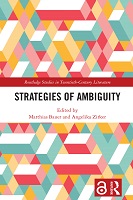Strategies of Ambiguity
Proposal review
Contributor(s)
Bauer, Matthias (editor)
Zirker, Angelika (editor)
Language
EnglishAbstract
There has been a growing awareness that ambiguity is not just a necessary evil of the language system resulting, for instance, from its need for economy or, by contrast, a blessing that allows writers to involve readers in endless games of assigning meaning to a literary text. The present volume contributes to overcoming this alternative by focusing on strategies of ambiguity (and the strategic avoidance of ambiguity) both at the production and the reception end of communication. The authors examine ways in which speakers and hearers may use ambiguous words, structures, references, and situations to pursue communicative ends. For example, the question is asked what it actually means when a listener strategically perceives ambiguity, which may happen both synchronically (e.g. in conversations) as well as diachronically (e.g. when strategically ambiguating biblical texts in order to make them applicable to moral lessons). Another example is the question of whether ambiguity awareness increases the strategic use of ambiguity in prosody. Moreover, the authors enquire not only into the effects of ambiguous meanings but also into the strategic use of ambiguity as such, for example, as a response to censorship or as a means of provoking irritation. This volume brings together several contributions from linguistics, literary studies, rhetoric, psychology, and theology, and it aims to provide a systematic approach to the strategic production and perception of ambiguity in a variety of texts and contexts.
The Open Access version of this book, available at http://www.taylorfrancis.com, has been made available under a Creative Commons Attribution-Non Commercial-No Derivatives 4.0 license.


 Download
Download